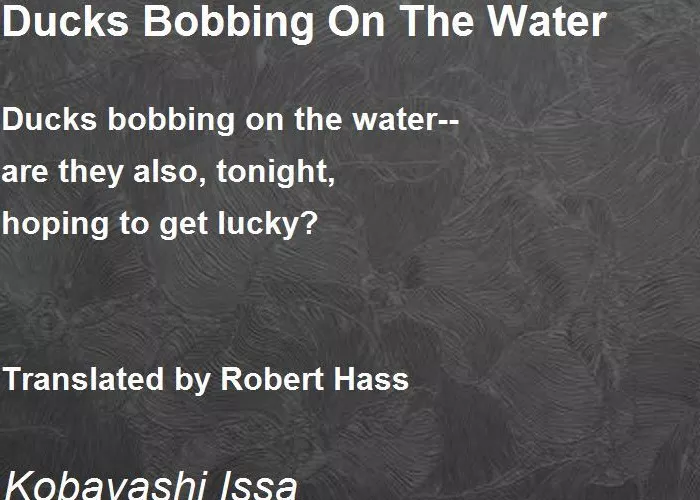Welcome to Poem of the Day – Ducks Bobbing on the Water by Kobayashi Issa.
The haiku ducks bobbing on water by the famous Japanese poet Kobayashi Issa encapsulates a moment of simple yet profound reflection, infused with a playful human observation. This seemingly straightforward haiku invites readers to explore themes of nature, desire, and the human condition through the lens of a fleeting encounter with the natural world. The poem‘s brevity, common in haiku, allows for an open-ended interpretation, providing layers of meaning with its subtle humor and delicate tone.
Ducks Bobbing on the Water Poem
ducks bobbing on water—
are they also, tonight
hoping to get lucky
Ducks Bobbing on the Water Poem Explanation
In the classic Japanese tradition, haiku is a poetic form consisting of three lines with a 5-7-5 syllabic structure. Issa adheres to this format, presenting a vivid image of ducks bobbing on the water. The first line, “ducks bobbing on water,” establishes the scene with striking simplicity. The image of ducks moving gently in the water is one that is easily recognizable and universally understood, evoking a sense of calm and peace. The rhythm of the poem mirrors the gentle, repetitive motion of the ducks, almost like a dance or meditation in nature.
The second and third lines take an unexpected turn. By asking, “are they also, tonight / hoping to get lucky?”, Issa anthropomorphizes the ducks, attributing to them the same desires and whims as humans. This subtle shift in perspective creates an interesting tension in the poem. The reader is prompted to consider the natural world not as a purely mechanical or instinctual environment, but as a space where even the simplest creatures may experience moments of longing or desire.
The Natural World and Human Desire
At its core, this haiku explores the intersection between the natural world and human emotions. Issa does not simply describe the ducks’ behavior, but instead, through a playful question, connects the creatures’ movements to the human experience of longing or desire. The word “lucky” introduces an anthropocentric concept that belongs to the realm of human experience. It suggests that, like humans, the ducks might be acting with an underlying motive—perhaps a search for companionship, fulfillment, or some other form of reward.
The use of the word “tonight” imbues the scene with an air of mystery, signaling that there is something beyond the ordinary in the ducks’ behavior. It is no longer just about ducks bobbing in the water, but about a shared, almost universal desire for connection, intimacy, or even fate. In this way, Issa blurs the lines between human beings and animals, revealing the common threads of experience that tie all living creatures together.
The Playfulness of the Haiku
There is a noticeable playfulness in Issa’s haiku. By using the phrase “hoping to get lucky,” he introduces a colloquial, almost humorous tone into the poem. The expression “get lucky” typically refers to romantic or sexual success, an inherently human concept. The use of this phrase in connection with ducks introduces a delightful absurdity to the poem. It prompts the reader to laugh, but also to reflect on the absurdity of projecting human desires onto the natural world. Yet, this projection is not entirely unfounded. The natural world is filled with creatures driven by instincts that can sometimes resemble human desires, such as the need for companionship or mating.
Issa’s humor, however, is not crass or vulgar; it is subtle, suggesting that even in the seemingly mundane and peaceful movements of ducks on the water, there may be a deeper, more universal significance. The haiku encourages the reader to recognize the humor in life’s ordinary moments, as well as the potential for profound connections to emerge from the simplest experiences.
The Philosophical Underpinnings
On a deeper level, Issa’s haiku could be interpreted as a meditation on the nature of life itself. The ducks, bobbing on the water, symbolize the continuity of life, flowing with the rhythm of nature. Their seemingly aimless movement on the water mirrors the often unpredictable course of human existence. By asking whether the ducks are “hoping to get lucky,” Issa acknowledges the randomness of life—sometimes, we are all just drifting along, hoping for something good to happen, whether it’s love, success, or even a moment of fleeting happiness.
The juxtaposition of human desire with the natural world suggests that desire is not solely a human trait. Just as the ducks instinctively move in search of food, shelter, or mates, humans too are driven by similar instincts, albeit often dressed in more complex, culturally constructed forms. In this sense, Issa’s haiku invites the reader to reflect on the shared nature of all living beings—our desires and our search for fulfillment are part of a larger, interconnected web of life.
Conclusion
Kobayashi Issa’s haiku, “ducks bobbing on water— / are they also, tonight / hoping to get lucky?”, is a delicate and playful exploration of human desire, nature, and the intersection of the two. Through the simple image of ducks on water, Issa reminds us that life, in all its forms, is imbued with longing, movement, and the search for something greater. The poem challenges us to see ourselves in the creatures of the natural world and to recognize the shared experiences that unite all living beings. It is a masterful example of how the smallest moments in nature can lead to profound reflections on the human condition, all wrapped in the brevity and elegance of haiku.

